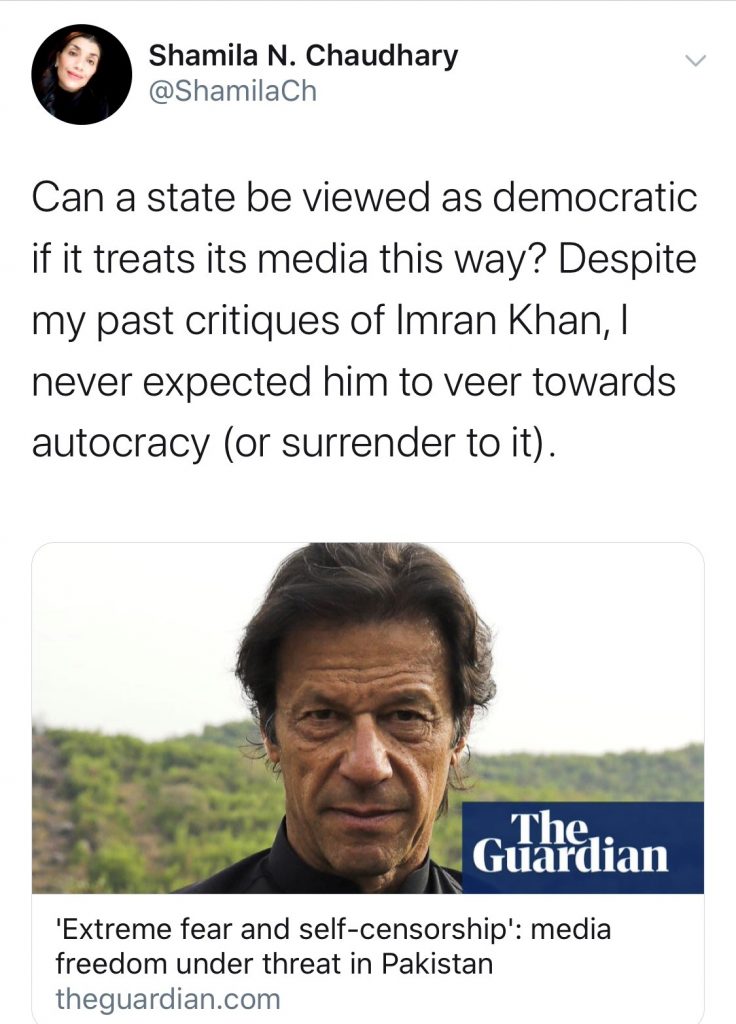Pakistan has always ranked high among countries that suppress media freedom and where the deep state is known to intimidate journalists and media houses. Yet, every time a new individual takes over as Pakistan’s Prime Minister or Army chief there are people in the West who believe that this person will change things and Pakistan will become a more open society.
A November 2019 investigative piece by The Guardian titled ‘‘Extreme fear and self-censorship’: media freedom under threat in Pakistan,’ has on the one hand shown the world what most Pakistanis already know but it has also led to many folks in Washington DC expressing incredulity that under Imran Khan press freedoms have further shrunk.

When Mr Khan came to Washington DC in July 2019, he denied that his government was repressing the media and even claimed that the media was fairer in Pakistan than in the US or the UK! Many in DC refused to challenge him when he said that. Today the same folks who praised his coming to power in 2018 are surprised that things are worse.
As The Guardian story notes “While Pakistan has a turbulent relationship with media freedom, under Imran Khan, elected as prime minister last year with strong backing from the military, censorship is felt heavier than ever before. Journalists, activists, authors and politicians spoke to the Guardian of a climate of “extreme fear and self-censorship”, and the suppression of opposition political voices, even worse than during the military dictatorship of General Zia, who oppressively ruled Pakistan between 1977 and 1988. Hussain’s account of direct involvement by the military and political authorities in censoring stories critical to the government was repeated by half a dozen journalists. The pressure was reportedly exerted both through direct edicts to editors and producers, to less direct but more costly interventions such as pulling TV stations from transmission, targeting advertising revenue of dissenting media or pulling newspapers from circulation. In many cases, the trend towards heavy censorship pre-dates Khan’s premiership, but he has been criticised for allowing it to continue, if not ramping it up. Dawn, Pakistan’s largest English language newspaper, suffered huge financial losses in June last year when the military restricted its distribution after they published leaks of secret military meetings. The censoring of critical voices is not only restricted to media. Last week, an exhibition at the Karachi Biennale by the artist Adeela Suleman, called The Killing Fields of Karachi, which addressed the extrajudicial deaths of 444 people at the hands of the police chief Rao Anwar, was raided by the authorities and ordered to be shut down. Senior management figures spoke anonymously of a draconian approach of collective punishment which was being inflicted on media organisations. If one reporter or news channel reported a story that threw the government into disrepute, the business interests of the media owners would be targeted or advertising funding withheld. The military’s hostility towards the media was demonstrated in June last year, when Maj Gen Asif Ghafoor, the director general of the ISPR, singled out dozens of journalists for their “anti-Pakistan” activity on social media. He repeated the sentiment on his own Twitter account in July this year, calling out “irresponsible” journalists, which led to the hashtag #ArrestAntiPakjournalists to trend on Twitter in Pakistan, used more than 28,000 times.”
![]()





